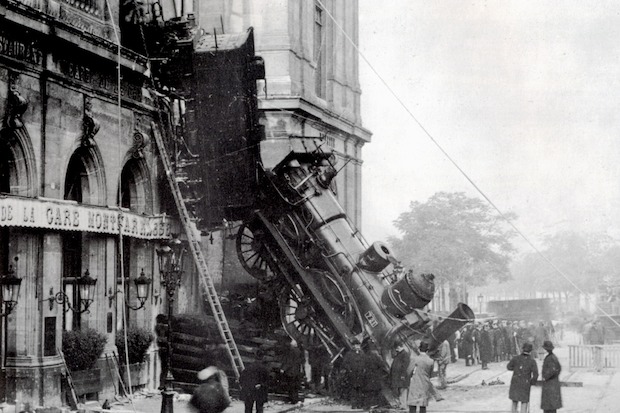When George Osborne first announced his plans for high speed rail, I was all for it. I’ve spent too much of my life on broken-down trains between Inverkeithing and London – and, like many Scots, resented the way that most transport money seemed to be spent in the imperial capital. As I say in my Telegraph column today, the key to staying happy about HS2 is not to think about it much further: don’t contemplate the costs, don’t ask if transport can be helped in other ways. This is what Westminster is doing: all its parties have signed up to the project. They won’t have a proper debate about it.
We at The Spectator did out bit last night, with yet another highly successful debate on HS2. We had Nigel Farage vs Matthew Parris – and the debate nearly didn’t go ahead as we struggled to find an independent transport expert to speak with Matthew for HS2. Or an MP. There seem to be a great number of very loud people with a working interest in HS2, but independent rail commentators – even those who love rail – seem to think it a lunacy. There are so, so many better ways to spend £50 billion. Here, for example, is what one former HS2 adviser says:
‘For example, the final decision on HS2 was delayed while the transport secretary decided whether to spend an extra £500 million on another tunnel under the Chilterns. To put that figure in perspective, we should note that it is three times the amount allocated to local transport projects by the Autumn 2011 spending review.’
To understand the scale of HS2, and the urgently-needed infrastructure spending it would displace, is to be deeply suspicious of the starry-eyed arguments from its advocates. Supporters of HS2 tend to use abstractions (‘We need infrastructure! Speed is good! Be modern! Have ambition! Nimbys are evil!) Those against HS2 make arguments loaded with facts, figures and rational arguments. Perhaps this is why the debate has shifted against HS2 over the summer.
YouGov has plotted the support for HS2. Here it is:
And on a geographical basis, HS2 is most popular in London but is less popular the further north you go. Here’s the YouGov breakdown:
So this policy is an unusual way to woo northern voters. But then again, the government should have been aware of this. The Department for Transport’s own poll (pdf), March 2011 showed only 9 per cent saying they opposed – a figure that may have given Osborne encouragement. Then, it may have seemed like the majority vs the nimbys. So how come opposition has jumped to 53 per cent?
A clue lies in the original DfT poll. Some 50 per cent agreed that ‘high- speed rail is £30 billion we cannot afford’. People like the idea as a general concept – as I did. But come out against it when working out the staggering price tag.
And will it even help the North? Prof Henry Overman from the London School of Economics was an HS2 adviser, but quit after concluding that too few of his fellow advisers were able to keep track of this sprawling project. His verdict is here (pdf) but here’s an extract:
‘Take, for example, the claim by the transport secretary, writing in the Telegraph to mark the end of the public consultation, that high-speed rail is ‘the fast track fix for bridging the North-South divide
’. This is a clever, but completely misleading, headline. The article itself is more tempered – ‘tackling a divide that has lasted for generations is no easy task’ – but it still makes big claims for the potential impact of high-speed rail. These claims rely on the assumption that reducing journey times (and increasing capacity) will help firms and workers in the North to compete more effectively for market share in the South (or encourage firms and workers to relocate). But HS2 will also give firms in the South better access to markets in the North. In line with this informal intuition, Nobel laureate Paul Krugman and other researchers working on the so-called ‘new economic geography’ have shown that reducing transport costs between ‘core’ (the South) and ‘periphery’ (the North) may actually increase disparities, not reduce them. Certainly the evidence on the direct benefits suggests that these flow disproportionately to London and the South East.’
It becomes clearer why HS2 is most popular with Londoners: it will benefit them disproportionately. And yet ministers still seem to see this some kind of regional aid programme.
Osborne is nothing if not a tactically shrewd politician. He will not mind fighting with the Tory rebels who defied yesterday’s Bill but will mind fighting with target voters in the North and the Midlands concerned that their money can be used in better ways. (It’s mainly for business travellers: a return ticket from Manchester will cost about £550) Below shows how Northern and Midland voters think transport costs should be allocated.
California’s experience shows that people are enthusiastic about high speed rail at first, but become far less so when they realise how little will be achieved for so great a cost. Politically, this is a dud – and everyone in Whitehall knows it. George Osborne is riding high right now: he has enough political capital to avoid this. He’s already being opposed by the CBI, the NAO, the IEA and 52 per cent of northern voters – a figure that’s growing fast. HS2 is an analogue solution being misapplied to our digital age. Our Chancellor can certainly think of something better.







Comments